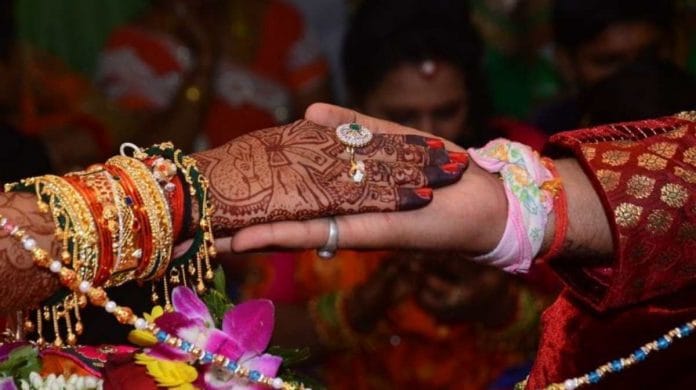New Delhi: The Madhya Pradesh High Court ordered an investigation Tuesday against an Arya Samaj trust in Ghaziabad, Uttar Pradesh, for allegedly “converting people from one religion to another” and “solemnising marriages” without any authority of law.
A bench of justices Rohit Arya and Milind Ramesh Phadke directed Ghaziabad’s senior superintendent of police to look into the members, activities and account books of the Arya Samaj Vivah Mandir (temple marriage) Trust and to take “suitable corrective measures” according to the law.
If need be, the court added, the police should forward an enquiry report to the competent authority under the relevant Trust Act to initiate action against it.
The court said that the activities of the trust were “tantamount to running marriage shops on commercial lines” and posed a threat to the “sanctity attached to marriages recognised under personal laws, particularly Hindu Marriage Act”.
The court maintained that an Arya Samaj trust can solemnise marriage between two Arya Samajis but cannot convert someone from one religion to another.
The court order came on a habeas corpus petition filed by a Hindu man in December 2021, seeking the release of his “wife” from a women’s shelter in Gwalior, where she had been lodged.
However, the habeas corpus petition had then turned into an enquiry into how the woman was converted from Islam to Hinduism.
In Tuesday’s order, the court also held that the woman’s conversion certificate as well as the couple’s marriage certificate were “null and void”.
Also read: ‘Compels conversion, violates liberty’: Why Allahabad HC ripped into Special Marriage Act
Marriage, conversion, and a legal U-turn
In 2019, a couple who had “eloped” from Madhya Pradesh tied the knot at the Arya Samaj Vivah Mandir Trust in Ghaziabad, Uttar Pradesh.
The marriage was solemnised after the woman — a Muslim who had converted to Hinduism — signed an affidavit in the presence of the temple’s president, embracing the new religion.
When the couple returned to their home state, the woman moved a petition in the MP High Court for police protection.
The HC ordered the couple to appear before the area sub-divisional magistrate, who, on noticing that the girl was three months short of adulthood, ordered for her custody to be handed over to a Nari Niketan in Gwalior.
In December 2021, the man approached the HC with a plea that his wife had now attained majority and, therefore, should be released to live with him.
But instead, his petition turned into an inquiry into the woman’s conversion under the Arya Samaj tradition and the legality of the couple’s marriage. The HC then issued a notice to MP’s advocate-general and the Vivah Mandir Trust for their response.
The trust raised a preliminary objection about the jurisdiction of the MP High Court to deal with the matter since the marriage had taken place in UP. On the issue of the conversion and the woman’s age, the trust claimed that her Aadhaar card had indicated that she was an adult.
Further, the trust said, she had submitted an affidavit to confirm her conversion to Hinduism and that she was marrying out of her free will. The conversion certificate was issued to the girl on the basis of this affidavit.
Conversion & marriage certificates ‘null and void’
The MP government rejected the challenge to the high court’s jurisdiction on the ground that the couple belonged to MP and were residing in the state when the habeas corpus petition was filed.
The state accused the trust of illegally issuing certificates of marriage and religious conversion.
“The alleged act of conversion and marriage, in fact, are classic instances of fraud and mis-representation alluring the ignorant young boys and girls…” the state lawyer told the bench.
The court accepted the state’s concern that the trust had committed a “public wrong” and had posed a “serious threat to public order and social fabric”. It also averred that the trust’s actions had the potential to trigger mass unrest and communal tensions.
The court further drew attention to the fact that the trust facilitated the conversion without informing the district magistrate of the couple’s area.
This, the court added, was imperative under the Madhya Pradesh Dharma Swatantrya Adhiniyam (Religious Freedom Act), 1968, that provides for a detailed religious conversion ceremony.
A similar law prevails in UP, but the trust did not intimate the district magistrate of Ghaziabad either, the court observed.
Further, it said, a marriage certificate can only be issued by a competent authority as provided under the Special Marriage Act or the Compulsory Registration of Marriage Rules, for which the trust was not qualified. Therefore, the court said, it had no hesitation in holding that the conversion and marriage certificates were both “without any authority of law and, hence, null and void”.
On the issue of the woman’s release, the court observed that since she was an adult, she had the right to choose her life. It asked the authorities to let her speak with her parents through video-conference. She can, thereafter, decide who to live with.
(Edited by Asavari Singh)
Also read: Karnataka HC ‘misread’ Quran translation to hold hijab not essential, petitioner tells SC






